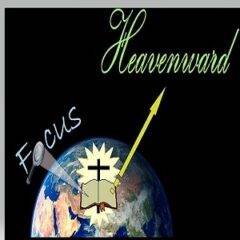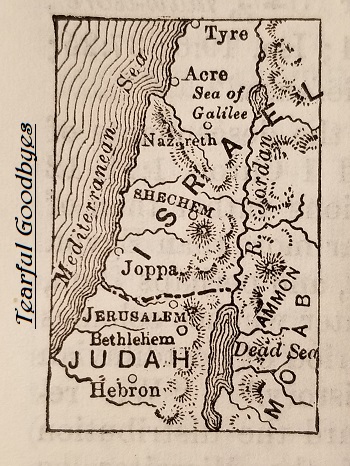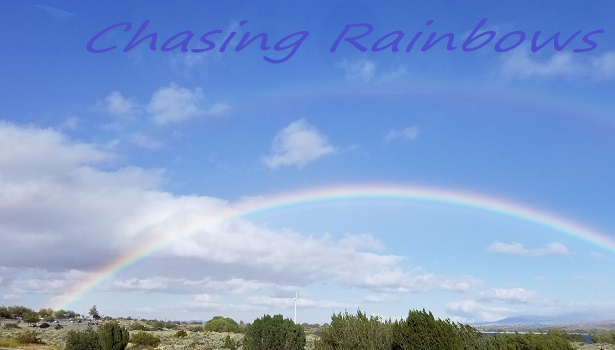The first five verses in Ruth gave us some important details of people involved, location, time and specific circumstances. (See Chasing Rainbows, Ruth 1:1-5). In a short review, we have Elimelech leading his family – wife Naomi, and sons Mahlon and Chilion – out of Bethlehem in Judah and into Moab during a time of severe famine. Moab was widely known as a land which worshipped heathen gods. Elimelech dies and both sons marry Moabite women – Ruth and Orpah. Then Mahlon and Chilion die, leaving Naomi, Ruth and Orpah as widows in a culture and time where woman were quite dependent on men for their care and provision. This is a dire situation. We now pick up the book of Ruth in verse six – Naomi makes decisions and takes action for her future and that of her daughters in law.
Ruth 1:6-7 Then she arose with her daughters-in-law that she might return from the land of Moab, for she had heard in the land of Moab that the LORD had visited His people in giving them food. 7 So she departed from the place where she was, and her two daughters-in-law with her; and they went on the way to return to the land of Judah.
Naomi makes a decision to return to Bethlehem. She hears that the famine is over which would mean there is now better opportunity for her care amongst the family and friends she had left behind when moving to Moab with her husband and sons. Although circumstances may lead us to believe that God has forgotten his children, this is never the case. He bestows His blessings at the perfect time, often requiring us to trust in His timing and direct provision. He will always provide what is necessary in our lives for His glory. Do we recognize this in our own lives – do we see God’s blessing hands guiding us?
Exodus 4:31 So the people believed; and when they heard that the LORD was concerned about the sons of Israel and that He had seen their affliction, then they bowed low and worshiped.
Ruth 1:5 says “the Lord had visited His people in giving them food”. Many families say a prayer of thankfulness when they eat. I pray we do not just say words habitually but instead recognize it is God’s blessing to have food to eat. God cares for His children, He knows our needs and bestows every good gift upon those who love and obey Him. It is easy for us to become expectant of having food when we are hungry. We should always remember that every blessing is a gift from God’s hand. It is His goodness that sustains His children.
James 1:17 Every good thing bestowed and every perfect gift is from above, coming down from the Father of lights, with whom there is no variation, or shifting shadow.
Matthew 6:11 says, 'Give us this day our daily bread’ as an example of how we ought to pray to God – recognizing whose hand it is that sustains us.
Elimelech had determined it was necessary to move out of Bethlehem during the famine but now that Naomi has heard it is over, she intends to return to her own country. Her decision may have been influenced by the reality that she was a woman alone in a strange country with little hope for providing for herself. She had no male relatives to seek for her welfare in Moab.
Both Naomi’s daughters in law accompanied her at the beginning of her return to Judah. Since the assumption is Orpah and Ruth had families in Moab, they must have had somewhat of an endearing relationship to Naomi to consider leaving their own means of support. Orpah and Ruth are now young widows and the same difficulty that Naomi faces of sustaining herself applies to them. It seems the easier thing for the young widows to do would be return to their Moabite relatives for support and the hope of remarrying. Even with their husbands no longer living, their faithfulness to Naomi speaks of their affection and kindness toward each other. Think again about the differences in the land and customs each of these women came from. Naomi was from Bethlehem, a country of devoted Jews, largely following the laws God handed down to Moses for the nation of Israel. Orpah and Ruth grew up in a land devoted to idle worship, perhaps including acts of abomination, far removed from the one true God. It doesn’t seem these women could be farther apart in their culture and practice.
We don’t have a written record of Naomi’s reaction to Mahlon and Chilion marrying the women from Moab. It may have been difficult for her to accept the decisions her sons made as they went against what they had been taught. Perhaps Naomi felt there was no other solution since they now resided in this foreign country and her husband, Mahlon’s and Chilion’s father, had died. Whatever her reaction to Orpah and Ruth, what we do see is that they had formed a close enough relationship to care for one another. Naomi had shown grace toward these young women even though it may have been difficult to accept them. Think about how this example of graciousness may translate to your own life and relationships. Are we reluctant to reach out to those who may look or think different than ourselves? How do we react toward the seemingly unwise decisions of others? Do we forget God will use all things for His glory and purpose? Our responsibility is to be longsuffering, always being ready to share truth, having an encouraging and gentle spirit in the hopes of a soul being drawn towards Christ.
1Corinthians 13:4 Love is patient, love is kind, [and] is not jealous; love does not brag [and] is not arrogant,
2Corinthians 6:1, 3-4, 6 And working together [with Him,] we also urge you not to receive the grace of God in vain-- 3 giving no cause for offense in anything, in order that the ministry be not discredited, 4 but in everything commending ourselves as servants of God, in much endurance, in afflictions, in hardships, in distresses, 6 in purity, in knowledge, in patience, in kindness, in the Holy Spirit, in genuine love,
Back to our story line in Ruth. Orpah and Ruth walk with Naomi at the beginning of her travel back to Bethlehem. One commentary says it was the custom to accompany those whom they loved some part of their way when they went on a long journey (Patrick/Lowth/Whitby/Lowman Commentary). This again speaks of the relationship that had formed between Naomi and her daughters in law. The next verses, eight and nine, tell of Naomi’s encouragement to her daughters in law to return to their families.
Ruth 1:8-9 And Naomi said to her two daughters-in-law, "Go, return each of you to her mother's house. May the LORD deal kindly with you as you have dealt with the dead and with me. 9 "May the LORD grant that you may find rest, each in the house of her husband." Then she kissed them, and they lifted up their voices and wept.
It is possible that this conversation took place as the three women came to the borders of Moab. Naomi urges Orpah and Ruth to go back to their own mother’s house. She recognizes their kindness to herself and to her sons while they had been living, and she dismisses Orpah and Ruth with a blessing.
Consider this possible application as we look at our own relationships. Are we kind to the individuals God has placed in our lives? This is more than just smiling or having nice words to say. It is desiring God’s favor and mercy to be shown. Even when things get difficult do we continue in our care for one another, looking out for others best interests? Widowhood would expose Orpah and Ruth to a life of hardship. Desiring that they return to their own families and stay in the land where they are known would give them the best chance of finding a husband. Naomi is thinking more of them than herself. It would have been much easier for Naomi to have them accompany her on her journey back to Bethlehem. The three women had been through difficult circumstances together and the thought of parting was sorrowful. A kiss was the usual sign of greeting and farewell.
In conclusion, Ruth 1:6-9 has continued to be action packed. Upon hearing of God’s blessing in lifting the famine from Bethlehem, Naomi makes a decision to go back to her country after the death of her husband and two sons. Her daughters in law begin accompanying her, as was custom, to the edge of Moab. Naomi then encourages each of them to go back to the homes of their relatives where they would have the best chance of securing a future for themselves. A small insight into the women’s relationship together suggests that it was one of kindness and affection. Ruth dismisses the young women with a blessing that the kindness they have shown towards herself and her sons when they were alive, is turned towards them. Finally we read of the difficult and emotional good-byes as each woman prepares to go on her way.
Some additional thoughts to consider:
Naomi may have been separated for a time from her land and the customs of Jewish worship and law, yet she did not lose her desire to return to what she knew. What is our response when we are removed from our church family for a time? Do we miss being in fellowship? Does our desire to return remain strong?
Naomi’s concern for her daughters in law happiness is evident. We read this in verses eight and nine and down through verses 11-13 of this same chapter. The same desire of ‘rest’ – a more peaceful and secure life than that of widowhood – is again spoken of by Naomi toward Ruth in chapter three verse one.
Ruth 3:1 Then Naomi her mother-in-law said to her, "My daughter, shall I not seek security for you, that it may be well with you?
When our circumstances seem dire, are we still able to focus on the blessing of others? Do we suffer from tunnel vision, only able to see our own difficulties?





